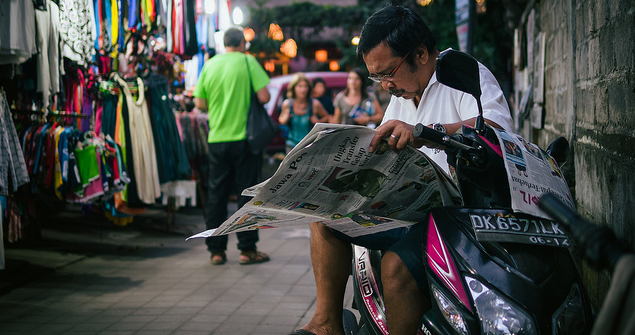The Bali Nine Executions: Indonesia’s Perspective

Although there is some debate on the death penalty in Indonesian society, Indonesian media are unified in their adamant support for harsh sentencing for drug trafficking.
In the lead up to the Bali Nine executions, many Indonesian politicians and leaders appeared in their national media. They defended Indonesia’s solidarity and the precarious situation of the island nation and highlighted the constant threats of international drug and people smuggling as well as international ‘bullying’. The majority of Indonesians appeared to support this defensive stance and the death penalty for drug smugglers, provided the judicial process was thoroughly carried out.
Indonesia’s Minister for Political, Legal and Security Affairs – Tedjo Purdijatno – was regularly interviewed in the lead up to these executions, responding to Australian and international outcry against the executions. He asserted that Australia should be thankful to Indonesia for foiling the attempted smuggling by Andrew Chan and Myuran Sukumaran of first-class crystal meth from Indonesia to Australia. “Such amount [would] create at least four million new addicts,” he said.
His statement seemed to reflect the attitude of most Indonesians. Jakarta-based survey agency – Indo Barometer – claimed that over 80 per cent of respondents supported the death penalty for drug smugglers on the basis that their actions lead to the deaths of innocent people and contribute to the ‘drug crisis’ in Indonesia. The latter point has been heavily criticised by Indonesian activists and on social media sites, where they claimed that there has been no credible research on the use of drugs in Indonesia leading to this assumption.
However, the frequent usage of the term ‘drug crisis’ in government press releases and statements has become doctrine in Indonesian society. It has created widespread sympathy for those who suffer from the effects of drugs directly and indirectly, while demonising those who supply and traffic drugs. This perception contributes to the overwhelming support for the death penalty for these crimes.
One counterargument on the executions posed by Indonesian activists has gained some substantial consideration. Migrant Care argues that Jokowi’s decision to carry out executions hampers efforts to save hundreds of Indonesians – most of whom are migrant workers – facing the death penalty abroad. Other groups that share similar concerns include the Commission for Missing Persons and Victims of Violence (Kontras), the Institute for Policy Research and Advocacy (Elsam), Setara Institute and Human Rights Working Groups (HRWG). This issue was covered widely for a period in the Jakarta Post and on social media sites, but slowly lost momentum, due to a lack of solid support. This issue has now resurfaced with the recent executions of two Indonesian women in Saudi Arabia, which has angered the Indonesian government and resulted in a decision to stop sending maids to 21 Middle Eastern countries. The ban affects countries including Saudi Arabia, the United Arab Emirates, Qatar, Bahrain and Egypt and will take effect in three months’ time. Additionally, the National Commission on Human Rights (Komnas HAM) and Imparsial – an Indonesian human rights group – have voiced concerns over Indonesia’s ability to uphold human rights and have called for the removal of the death penalty in Indonesia.
In a country whose past has been heavily plagued by corruption and bribery, Indonesian media has covered the issues surrounding the legality of the Bali Nine executions and their judicial processes, often leading to a resounding defence of Indonesian solidarity. Despite considerable pressure to thoroughly attend to the appeals of the foreign nationals on death row, the appeal for the lone Indonesian executed in the group – Zainal Abidin – has still not been heard by the courts as the initial appeal documents were ‘misplaced’ back in 2005 and only tracked down in January 2015. Following his execution, the local media noted the double standard within the judicial process, as well as the justification for his death sentence.
Additionally, the media has been heavily preoccupied with domestic issues and controversies, which many argue have influenced Jokowi’s decision to carry out the executions. The controversy surrounding the appointment of Budi Gunawan as the National Police Chief is one issue that has dominated the media. This appointment aggravated the Corruption Eradication Committee (KPK), who cited possible instances of corruption by Budi, and has resulted in a highly controversial tit-for-tat exchange between the police, the PDI-P and the KPK, which Jokowi is yet to resolve. It seems that Jokowi is not in control of his own political party, the Indonesian Democratic Party of Struggle (PDI-P), or even his ruling coalition, the Awesome Indonesia Coalition. His authority appears to be waning and he is often depicted as the puppet of his party’s chief, Megawati Sukarno Putri. Jokowi appears compelled to overly consider the wishes of influential political factions and his popularity has dramatically declined.
The international media commented on Jokowi’s desperation to regain domestic popularity as the most significant factor in his decision to go ahead with the executions of the convicted drug smugglers and downplay the international pressure to grant clemency. The Indonesian media has continually criticised Jokowi over many decisions since his presidency began at the end of last year, but has been considerably less critical of his decision to carry out the executions.
Ashley Rogge is an intern at the AIIA National Office. She has a Master’s Degree in International Affairs from the Australian National University and a Bachelor’s Degree in Anthropology from Cornell University. This article can be republished with attribution under a Creative Commons Licence.


